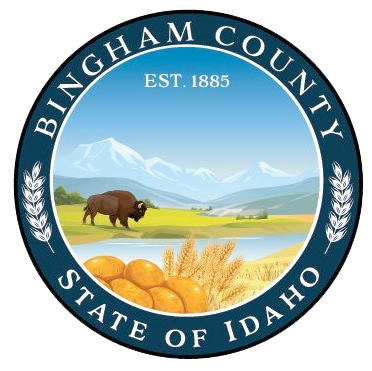Road & Bridge
Road & Bridge Overview
Bingham County currently maintains more than 1,228 miles of road (56 Percent are paved). 188 large bridges (with spans greater than 20 feet), and approximately 140 small bridges (with spans less than 20 feet). Bingham County Road and Bridge is involved in the coordination of all County transportation facilities. The primary focus of Bingham County Road and Bridge is maintenance and safety.
Maintenance Shops
Bingham County has a Road and Bridge Shop located at 245N 690W, approximately five miles northwest of the City of Blackfoot on U.S. Highway 26. It has two satellite shops, one located in the city of Shelley at 355 S. Emerson and the other in the townsite of Springfield at 1947W 800S, just off of U.S. Highway 39. These maintenance shops are responsible for maintaining all county vehicles, except the Sheriff's vehicles. The Road and Bridge Mechanics inspect and perform routine maintenance on all the Public Works equipment and passenger vehicles.
Road Maintenance
The County has implemented a seven-year rotation for seal coating the paved roads. To maintain this schedule, the County must sealcoat 89 to 90 miles of road each year, and have the necessary equipment available to undertake the work load.
Additional maintenance of the paved roads includes mowing weeds that grow on the shoulders and fore-slopes at least once per year. The County has a target of mowing shoulders along all paved roads twice each year.
Unpaved roads are maintained by grading a minimum of once a year and more frequently on higher traveled roads with the exception of the mountain roads in the eastern portion of the County. The weeds are mowed along the shoulders a minimum of once per year. Additional gravel is placed on the roads when needed.
Snow removal
PRIORITIES
Bingham County Road and Bridge has the following road priorities for snow removal:
First: High volume arterial roads; sanding of high volume intersections, school approaches, sharp curves, steep grades.
Second: High to medium traveled collector roads including school bus routes.
Third: Low volume local roads, primarily sub division roads, secondary roads and areas for recreation.
The normal snow removal process includes the following:
1. Monitor weather forecasts to anticipate the potential size and duration of expected storms.
2. During severe winter storms with high winds and/or minimal visibility, no equipment is mobilized until conditions improve to the point that snow removal operations don't endanger the operators, equipment or the public. Waiting until after the storm or the end of the storm does not undo the snow removal efforts of the plows.
3. Remove as much snow and ice as possible from the road surface. This may take several days and may also include "widening" the roadway (pushing the snow to the limits of the right-of-way).
Road and Bridge will not remove snow from private roads and driveways including those portions in the public right-of-way.
Obstructions - Roadway obstructions present a serious hazard for equipment operators. Obstructions can include landscaping, mailboxes, parked vehicles or piled snow from a residence or business. Road and Bridge will not assume any responsibility for damage to landscaping located in the right-of-way or mailboxes located too close to the roadway. Property owners who create obstructions in the public right-of-way can be issued a citation from the Sheriff's Office and could be liable for any injuries or damages occurring because of the obstruction as per Bingham County Codes 7-4-1 and 7-3-1.
Right-of-Way Obstructions
Obstructions in a public right-of-way present a safety hazard to the traveling public and Road and Bridge crews trying to maintain the county road. Obstructions can include landscaping, piles of rock, earth or snow, yard debris, mailboxes, signs and trenches among other things.
Fines for Violations - Idaho Code Section 18-3907 authorizes the Sheriff to issue a citation to anyone:...who obstructs, injures or damages any public road...". Violation of this law is punishable by up to six months in jail and / or a $300.00 fine. Property owners creating the obstruction may also be liable for any injury or damage attributable to the hazard as per Bingham County Codes 7-4-1 and 7-3-1.




